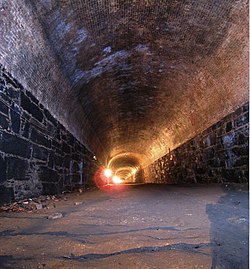Cobble Hill Tunnel
|
Cobble Hill Historic District
|
|

(2009)
|
|
| Location | Brooklyn, New York City |
|---|---|
| Coordinates | Coordinates: 40°41′25.6″N 73°59′42.5″W / 40.690444°N 73.995139°W |
| Built | 1844 |
| Architect | Asa Stebbins |
| Architectural style | Roman, Italianate, Queen Anne |
| NRHP Reference # | 89001388 |
| Added to NRHP | September 7, 1989 |
The Cobble Hill Tunnel (popularly the Atlantic Avenue Tunnel) of the Long Island Rail Road (LIRR) is an abandoned railroad tunnel beneath Atlantic Avenue in downtown Brooklyn, New York City. When open, it ran for about 2,517 feet (767 m) between Columbia Street and Boerum Place. It is the oldest railway tunnel beneath a city street in North America that was fully devoted to rail.
Originally built as an open cutting, construction began in May 1844, and opened for use on December 3, 1844, but was not completely finished until late Spring 1845. It was built mainly to satisfy public demand for creation of a grade-separated right of way for the Brooklyn and Jamaica Railroad (later Long Island Rail Road) on its way to the South Ferry at the foot of Atlantic Street (later Atlantic Avenue), where passengers could catch ferries to Manhattan. The construction of the cutting also lowered the LIRR's grade through Cobble Hill. Around five years after opening the cutting was roofed over, converting it into a tunnel.
In exchange for building the cutting, the City of Brooklyn granted the B&J permission to operate its steam locomotives on Atlantic Street west of Fifth Avenue (then Parmentier's Garden/Gowanus Lane), all the way to Brooklyn's South Ferry (the present location of Brooklyn's Pier 7). Prior to the cutting being built, the LIRR's western terminus was Atlantic Street at Clinton Street. Train cars were hauled by teams of horses along Atlantic Street from Clinton Street to Parmentier's Garden, where steam locomotives were attached. While the cutting was being built, the railroad operated to a temporary terminal at Pacific Street and Henry Street.
The Cobble Hill Tunnel was part of the first rail link between New York City and Boston, Massachusetts. The railroad connected Lower Manhattan via the South Ferry to Greenport on the North Fork of Long Island, where a ferry connected to Stonington, Connecticut, where a rail link continued to Boston. This avoided some difficult construction of bridges over the rivers of southern Connecticut. In 1848, the New York and New Haven Railroad Line was completed through Connecticut, providing a direct, faster rail connection from New York City to Boston. The Cobble Hill Tunnel and the Long Island Railroad remained the primary means of access to most of central Long Island from Manhattan and New York City. As originally built, the cutting was 21 feet (6.4 m) wide and 2,517 feet (767 m) long. Once roofed over the interior height of the newly-created tunnel was 17 feet (5.2 m).
...
Wikipedia



